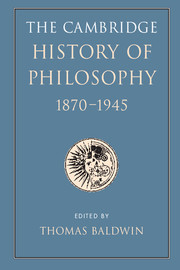Book contents
- Frontmatter
- Contents
- List of contributors
- Introduction
- I 1870–1914
- 1 Positivism, Idealism, and Pragmatism
- 2 Psychology and Philosophy
- 3 Logic, mathematics, and judgement
- 4 Philosophy and the new physics
- 5 The idea of social science
- 6 Ethics, politics, and legal theory
- 7 Philosophy of religion and art
- 24 Sceptical challenges to faith
- 25 The defence of faith
- 26 Art and morality: aesthetics at 1870
- 27 Form and feeling: aesthetics at the turn of the century
- Interlude
- II 1914–1945
- Biobibliographical appendix
- Bibliography
- INDEX
- References
25 - The defence of faith
from 7 - Philosophy of religion and art
Published online by Cambridge University Press: 28 March 2008
- Frontmatter
- Contents
- List of contributors
- Introduction
- I 1870–1914
- 1 Positivism, Idealism, and Pragmatism
- 2 Psychology and Philosophy
- 3 Logic, mathematics, and judgement
- 4 Philosophy and the new physics
- 5 The idea of social science
- 6 Ethics, politics, and legal theory
- 7 Philosophy of religion and art
- 24 Sceptical challenges to faith
- 25 The defence of faith
- 26 Art and morality: aesthetics at 1870
- 27 Form and feeling: aesthetics at the turn of the century
- Interlude
- II 1914–1945
- Biobibliographical appendix
- Bibliography
- INDEX
- References
Summary
In the period 1870 to 1914 there emerged new philosophical defences of religious experience and belief and new philosophies of faith. These programmes undertake a critique of the then dominant scientific positivism and its materialist and behaviourist doctrines. They can best be set out in the work of representative thinkers in four different contexts: in France, in Britain and the United States, and in Germany.
THE DEFENCE OF RELIGIOUS FAITH IN FRANCE
In France these new spiritualist philosophies trace their beginnings to a number of influential philosophers earlier in the century, such as François-Pierre Maine de Biran (1766–1824). He had argued that the study of human consciousness must begin with the distinctive experience of the human will and its efforts, without which perception, memory, habit, and judgement remain inexplicable. A true philosophy insists on free will and deliberative action, and points to an exigency or need for faith and religion. These interests are later pursued in the work of Emile Boutroux (1845–1921) and Henri Bergson (1859–1941). In his De la contingence des lois de la nature (1874), Boutroux attacks all forms of monistic materialism and determinism. He argues that natural laws alone are, finally, inadequate explanations, as is shown when one moves from the laws of one science to another, for example, from physics to biology to sociology and history. In Ideé de la loi naturelle (1895), Boutroux further argues that the activity of the human mind is holistic, necessarily engaging the entire person, and this activity portends certain spiritual needs that issue in such creative activities as art, morality, and religion.
- Type
- Chapter
- Information
- The Cambridge History of Philosophy 1870–1945 , pp. 329 - 336Publisher: Cambridge University PressPrint publication year: 2003



